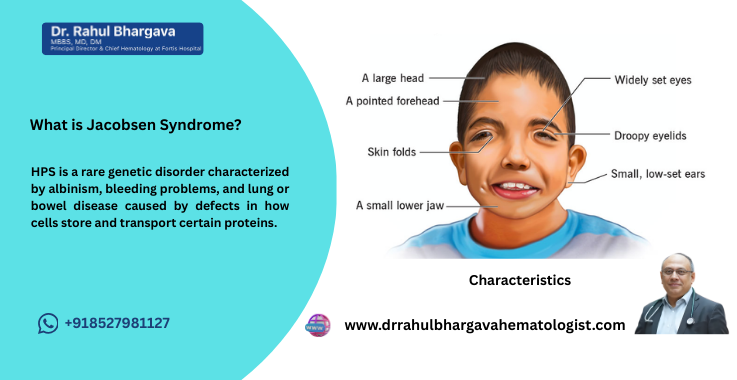Jacobsen Syndrome Treatment in India

Jacobsen Syndrome is a rare genetic disorder caused by a deletion of a part of chromosome 11 (specifically 11q). This deletion affects multiple organ systems and results in a variety of physical, developmental, and intellectual challenges. The syndrome is typically associated with heart defects, growth delays, intellectual disabilities, behavioral problems, and distinct facial features.
Jacobsen Syndrome is typically diagnosed in early childhood, and its severity can vary significantly depending on the size of the chromosome deletion and the specific genes affected. It is usually not inherited and occurs as a sporadic genetic mutation, though in some cases, it can be inherited from a parent who carries a balanced translocation.
What is Jacobsen Syndrome?
Jacobsen Syndrome is a genetic disorder characterized by intellectual disabilities, developmental delays, and distinct facial features. The deletion of genetic material from chromosome 11 causes a wide range of physical and cognitive challenges. Individuals with this condition often have issues with bleeding disorders, heart defects, and immune system irregularities.
Causes of Jacobsen Syndrome
Jacobsen Syndrome is caused by the loss of genetic material on the long arm (q) of chromosome 11, also known as a “partial deletion.” This deletion can happen randomly during the formation of reproductive cells or in early fetal development. Most cases are not inherited but occur due to random genetic changes. Only in rare cases is it passed down from a parent who carries a balanced translocation.
Types of Jacobsen Syndrome
While Jacobsen Syndrome itself is a singular genetic condition, the manifestations can vary greatly between individuals. The severity of the condition largely depends on how much genetic material has been lost. This variation leads to different degrees of intellectual disability, physical malformations, and health complications.
Symptoms of Jacobsen Syndrome
The symptoms of Jacobsen Syndrome can differ based on the individual but commonly include:
- Facial Features: Broad nasal bridge, downturned corners of the mouth, and wide-set eyes.
- Developmental Delays: Speech delays, intellectual disabilities, and learning challenges.
- Bleeding Disorders: Many individuals experience thrombocytopenia (low platelet count), leading to easy bruising and prolonged bleeding.
- Congenital Heart Defects: Issues such as ventricular septal defects or Tetralogy of Fallot.
- Growth Delays: Many children with Jacobsen Syndrome experience slower-than-average growth, both before and after birth.
- Behavioral Problems: ADHD, anxiety, and compulsive behaviors are often noted.
Diagnosis of Jacobsen Syndrome
Diagnosing Jacobsen Syndrome involves a combination of clinical evaluations and genetic testing. Dr. Rahul Bhargava employs advanced diagnostic methods, including:
- Karyotyping: This test examines the chromosomes under a microscope to identify any visible deletions or abnormalities.
- FISH (Fluorescence In Situ Hybridization): This more detailed test detects smaller deletions that might not show up in a standard karyotype.
- Array CGH (Comparative Genomic Hybridization): This is the most advanced and sensitive test for detecting genetic imbalances like the deletion seen in Jacobsen Syndrome.
Treatment for Jacobsen Syndrome
While there is no cure for Jacobsen Syndrome, treatment focuses on managing symptoms and improving the patient’s quality of life. Dr. Rahul Bhargava and his team offer comprehensive care, including:
- Management of Bleeding Disorders: Blood transfusions or platelet replacement therapies may be needed for individuals with severe thrombocytopenia.
- Heart Surgery: In cases of congenital heart defects, surgical interventions are often necessary.
- Developmental Therapies: Speech therapy, occupational therapy, and physical therapy help children reach their developmental milestones.
- Educational Support: Individualized education plans (IEPs) help manage learning and behavioral difficulties.
Cost of Treatment and Stay in India
The cost of treatment for Jacobsen Syndrome in India can vary depending on the specific needs of the individual, including diagnostic tests, medical care, and ongoing therapies. India offers a range of affordable options for managing genetic disorders, making it an attractive choice for medical tourists seeking high-quality care at a lower cost compared to Western countries. Below is an overview of the costs associated with the treatment of Jacobsen Syndrome:
-
Initial Consultation with Specialist:
USD: $30 – $100
INR: ₹2,200 – ₹7,400 -
Genetic Testing (Karyotyping, FISH, Array CGH):
USD: $200 – $800
INR: ₹15,000 – ₹60,000 -
Management of Bleeding Disorders (Platelet Transfusion/Therapies):
USD: $100 – $500 per session
INR: ₹7,400 – ₹37,000 per session -
Heart Surgery (if required):
USD: $4,000 – $10,000
INR: ₹3,00,000 – ₹7,50,000 -
Developmental Therapies (per month):
USD: $100 – $500
INR: ₹7,400 – ₹37,000 -
Hospital Stay (per night):
USD: $25 – $200
INR: ₹2,000 – ₹15,000 per night
India provides affordable healthcare services for genetic disorders like Jacobsen Syndrome, making it a popular destination for those seeking treatment. The cost is considerably lower than in Western countries while maintaining a high standard of medical care and expertise.
Frequently Asked Questions
Most cases of Jacobsen Syndrome occur due to a random genetic mutation. However, in rare cases, it can be inherited from a parent who has a balanced translocation.
There is no cure for Jacobsen Syndrome. However, with appropriate treatment and therapies, many individuals can lead fulfilling lives.
Jacobsen Syndrome can be diagnosed before birth through prenatal genetic testing, or after birth using genetic tests such as karyotyping or FISH.